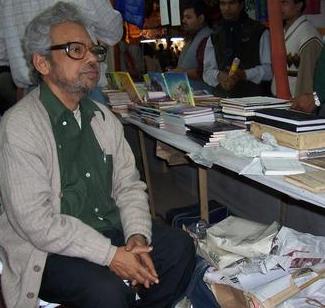 In 1957, Truman Capote wrote an article on Marlon Brando titled “The Duke in His Domain”. (This link is to an extract of the article, accessible from the New Yorker site. The full article is occasionally accessible from the New Yorker archives here. For the full article - email me on the id given in my profile.) I thought that title was very apt for this picture of Bengali writer Subimal Misra sitting with his books in the little magazines pavilion of the Calcutta Book Fair (January 2006).
In 1957, Truman Capote wrote an article on Marlon Brando titled “The Duke in His Domain”. (This link is to an extract of the article, accessible from the New Yorker site. The full article is occasionally accessible from the New Yorker archives here. For the full article - email me on the id given in my profile.) I thought that title was very apt for this picture of Bengali writer Subimal Misra sitting with his books in the little magazines pavilion of the Calcutta Book Fair (January 2006).Since late last year, I have been quite deeply involved in translating the short stories of Misra. And engaged in a close relationship with Misra (almost entirely over the phone, in terms of communication) , who gave me the green signal and his blessings and trust. I hope to get a volume of his stories in English published.
Ankur Saha has written a good introduction to Misra in the Bengali e-zine Parabaas.
Subimal Misra has been described as the father of the experimental novel in Bengali and the leading anti-establishment writer in this language. He has steadfastly disavowed recognition and commercial publication, writing only for non-commercial literary publications (or "little magazines") and spurned invitations from major Bengali publications. Misra’s first collection of stories, titled Haran majhir bidhoba bou-er moda ba shonar gandhimurti ("Haran Majhi's widowed wife's corpse or the Gandhi statue of gold"), was published in 1971. Over 20 volumes of his stories (or “anti-stories”), novellas, novels (or “anti-novels”), plays and essays have been published. Most of these have been published and distributed by the author himself. Misra’s most recent book of stories and essays, Kika Cutout was published in 2006. Now a retired school-teacher, he lives in Calcutta.
As I mentioned in an earlier post, two stories of Misra translated by me are carried in Hackwriters.com.
Misra has tried to bring the style of Jean Luc Godard into Bengali writing. Dostoevsky, Joyce, Jean Paul Sartre, Burroughs, Fellini, Ritwik Ghatak are among other important points of his reference /inspiration.
For a serious reader of literature, Misra is a writer to take note of. For the evidence of his story-telling ability from his earliest work; the status-quo demolishing implict in his life and work; the quality and power of what he has written (from 1967) and continues to write; for frontally taking on the entire domain of commercial publishing and Bengali literature; for forging and adhering steadfastly to a lonely alternative path of writing-publishing-selling. And in the whole process raising so many questions, that seize and shake a reader lulled and dulled into deeply uncritically internalised notions, assumptions, beliefs, attitudes. He is largely unknown, even to serious readers, though many well-known writers and intellectuals are familiar with his name and there is a sizeable band of Bengali readers in India and Bangladesh who are avid readers of his work.
I was struck by the remarkable parallels between the work of Misra and Elfriede Jelinek, the Austrian writer who was awarded the Nobel in 2004. Again it was my friend Dr Mrinal Bose (who introduced me to the name of Subimal Misra) who suggested a correspondence between these two writers, from such widely different cultures and backgrounds. Reading Jelinek’s lecture at the Nobel awards ceremony, the presentation speech on behalf of the Swedish Academy and an article about her writing, and subsequently 3 of her books (Women as Lovers, Wonderful, wonderful times, and Lust) which I immediately got and read – in several instances one felt one was reading Misra’s writings or hearing about his work and stance.
Writers such as Jelinek or Misra must inevitably furrow a very lonely path. They are difficult to read, difficult to like. But if someone reaches through to what the writer is trying to say or do, why, and how - then they assume great significance and power in one's consciousness.
Last evening I spoke to Misra. It struck me that the blog-sphere is a fantasy come true for him: costless, free, open, infinitely accessible to all, for ever. Yet Misra has no idea about what the internet or blog-sphere is, yes he has heard about the internet and e-mail, he has seen computers – when he dictates his writing for data entry at the printer’s shop. But he is essentially utterly removed from the net-world. He is a humble man of poor means living reclusively in a tiny apartment in a remote suburb of Calcutta, entirely within the “vernacular-subaltern” sphere, though from that ground he reaches out to and engages with world literature, experimental / alternative writing and cinema. A little man who stands tall in the world of literature - while sitting firm, in his dukedom, of Bengali little magazines!


1 comment:
Interesting site. Useful information. Bookmarked.
»
Post a Comment